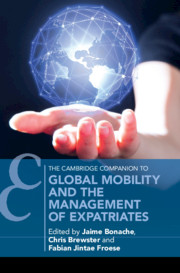Book contents
- Global Mobility and the Management of Expatriates
- Cambridge Companions to Management
- Global Mobility and the Management of Expatriates
- Copyright page
- Contents
- Figures
- Tables
- Contributors
- 1 Global Mobility
- Part I The Expatriation Process of Corporate Expatriates
- Part II Different Types of Expatriates and Stakeholders
- 7 Short-term Assignees, International Business Travellers, and International Commuters
- 8 Self-initiated Expatriates
- 9 Skilled Migrant Careers
- 10 Women and Global Mobility
- 11 Global Families
- 12 Roles and Challenges for Global Mobility Departments
- Index
- References
9 - Skilled Migrant Careers
from Part II - Different Types of Expatriates and Stakeholders
Published online by Cambridge University Press: 12 November 2020
- Global Mobility and the Management of Expatriates
- Cambridge Companions to Management
- Global Mobility and the Management of Expatriates
- Copyright page
- Contents
- Figures
- Tables
- Contributors
- 1 Global Mobility
- Part I The Expatriation Process of Corporate Expatriates
- Part II Different Types of Expatriates and Stakeholders
- 7 Short-term Assignees, International Business Travellers, and International Commuters
- 8 Self-initiated Expatriates
- 9 Skilled Migrant Careers
- 10 Women and Global Mobility
- 11 Global Families
- 12 Roles and Challenges for Global Mobility Departments
- Index
- References
Summary
This chapter explores three dimensions of migrant experience in the host country. First, we focus on the individual level issues and challenges related identity, resilience, motivation to integrate/expectations. Much of the individual level struggles are closely related to human capital translation process (i.e., credential recognition or lack there of) and decisions regarding continuation vs. change of previously established career pathways. Next, we focus on the social aspect of the migrant experience. Social capital and specifically lack of local social capital as one of the more difficult aspects of the migrant experience. We discuss various ways in which migrants can go about seeking and connecting to locals and establishing relationships in the new country (e.g., mentoring, ethnic communities). Finally, the third critical aspect of the migrant experience is related to organizational integration. Organizational experiences vary based on the local culture and also the size and the type of organization. Commonly discussed issues are related to organizational entry and later integration and collaboration with local employees.
Keywords
- Type
- Chapter
- Information
- Global Mobility and the Management of Expatriates , pp. 204 - 224Publisher: Cambridge University PressPrint publication year: 2020

